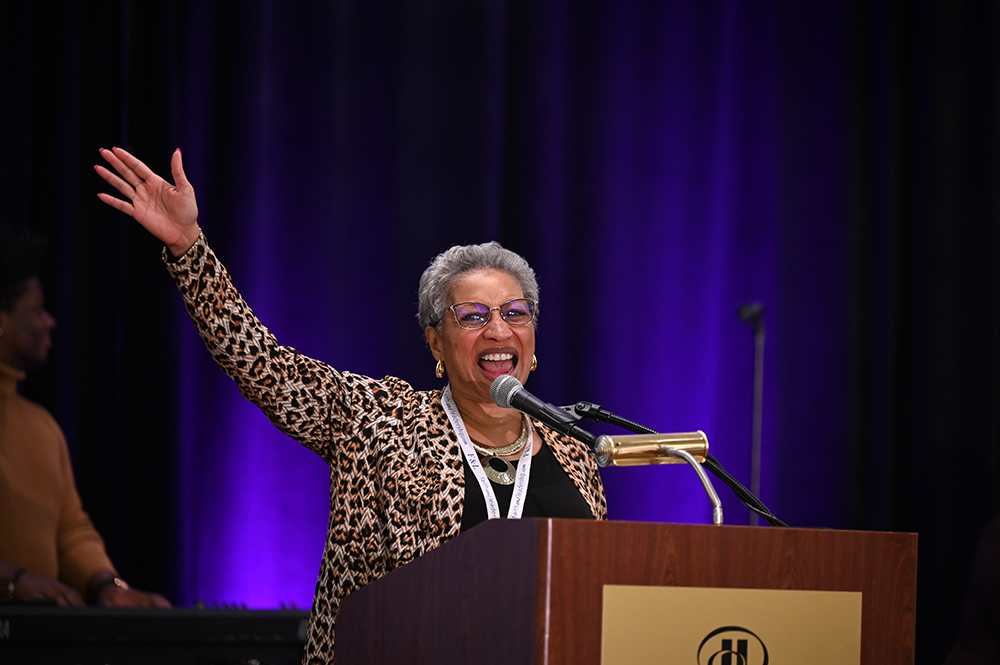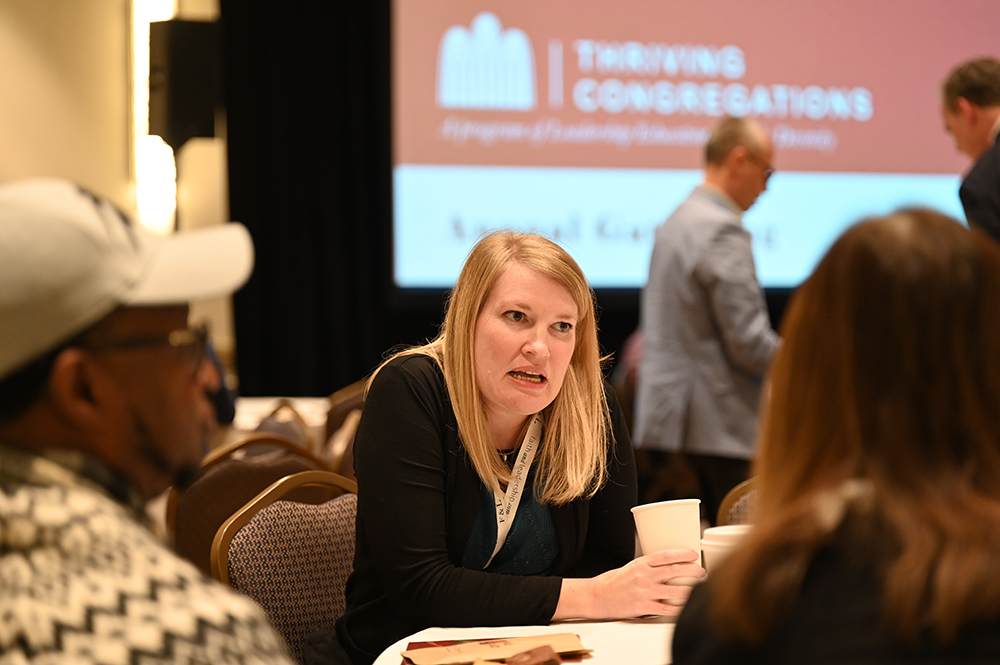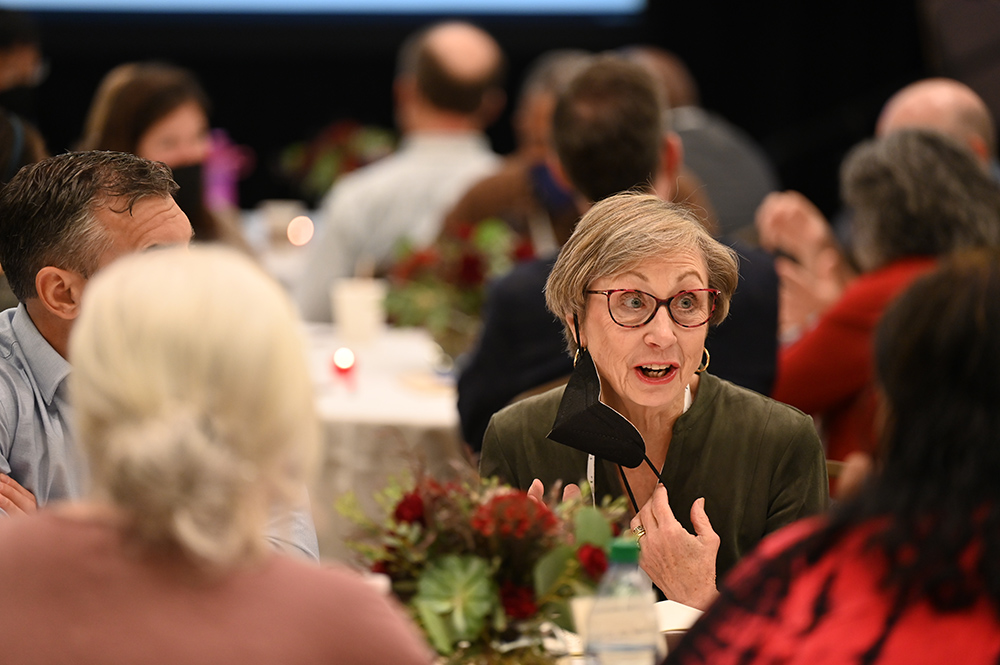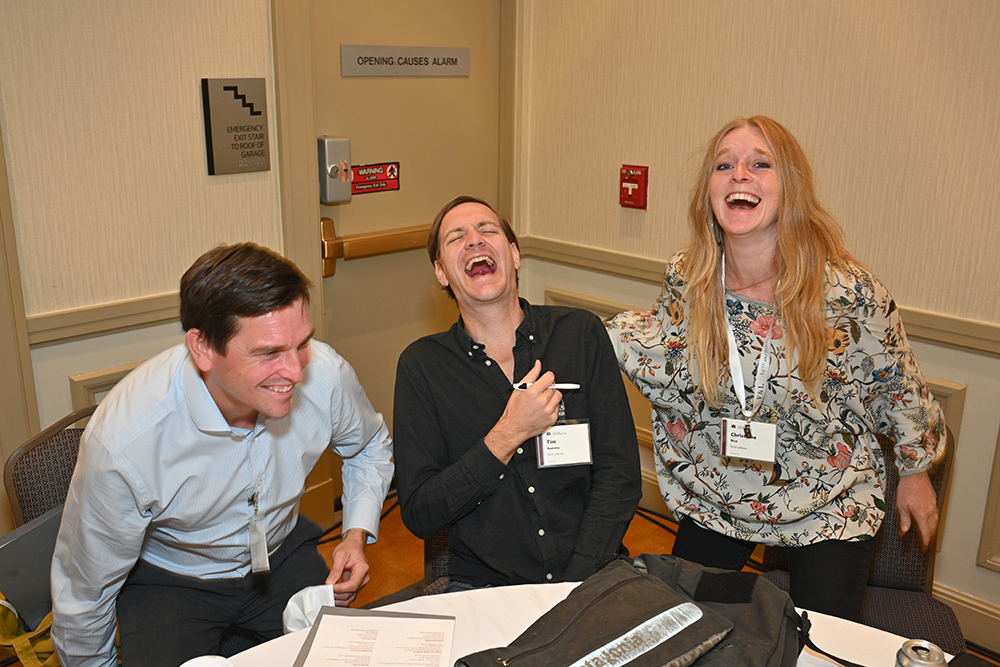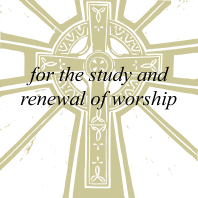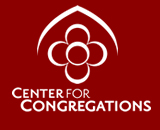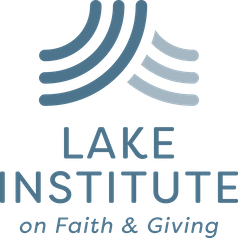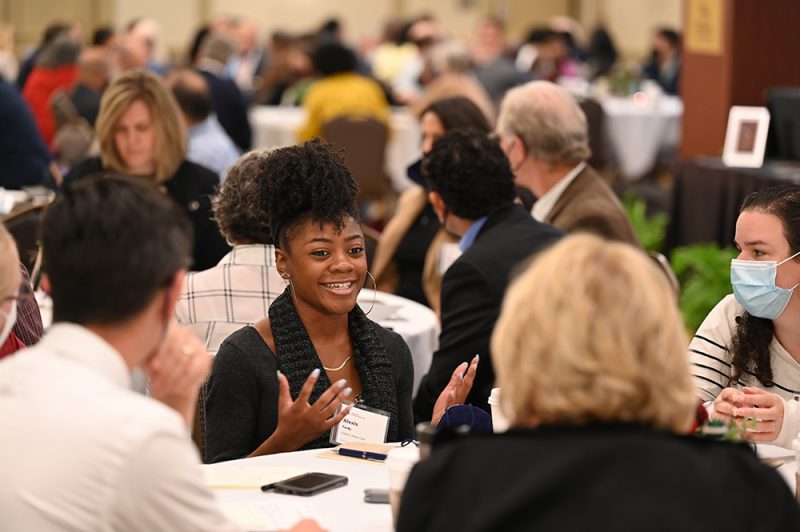
Thriving Congregations is a national initiative funded by Lilly Endowment Inc. to support institutions that want to help congregations to:
- Explore and understand their rapidly changing social and cultural contexts;
- Gain greater clarity about their mission and values; and
- Draw on Christian practices from their theological and ecclesial traditions to adapt their ministries to the demands of their changing contexts.
The ultimate purpose is to strengthen congregations so they can help people deepen their relationships with God, enhance their connections with each other and contribute to the flourishing of their local communities and the world. This aim is grounded in the conviction that local congregations have been and will continue to be the primary form of Christian community.
About the Initiative
As part of its commitment to the vitality of congregations, Lilly Endowment Inc. launched the Thriving Congregations Initiative in 2019 with an invitational round of grants to 22 institutions.
In 2020, following a national competition that drew hundreds of applications, Lilly Endowment awarded an additional 92 grants. In 2023 and 2024, an additional 123 grants were awarded. Each of the 237 grantees has up to $1.25 million to spend over three to five years to serve congregations and explore this question: What does it look like for congregations to thrive?
There is no "right" answer to this question, as this initiative will bear out over time. And yet many pastors, religious leaders and consultants agree that thriving congregations tend to share three general characteristics. In its request for proposals to build this initiative, Lilly Endowment Inc. writes that thriving congregations:
1. Recognize their changing social and cultural contexts
Thriving congregations exhibit a nuanced understanding of the characteristics, interests, history and challenges of their communities and neighborhoods. These congregations attend closely to demographic and social changes in their communities, and they understand the particular qualities that make their communities both what they are and what they are becoming. As active participants in the community, the members of the congregation build face-to-face relationships with people in their neighborhoods and understand well the ways they live, play, work and gather. Through these close connections with their communities, thriving congregations are able to listen to the needs and interests of people in their local and regional contexts and develop ministries that are highly relational and relevant for those they seek to reach. These ministries are created by individuals and groups in the congregation and help the members of the congregation respond to specific changes in their congregation’s community as well as to changes in the neighborhoods and regions the congregation seeks to serve.
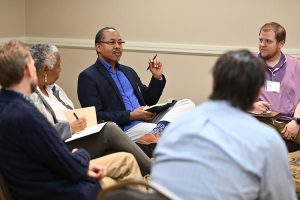 2. Exhibit clarity of values and mission
2. Exhibit clarity of values and mission
Thriving congregations have a striking clarity about their values and mission. Drawing on their theological and ecclesial traditions, they have developed a strong sense of identity and are able to articulate “why” they are called to love God and serve those in their congregations, neighborhoods, regions and across the globe. This clarity enables a thriving congregation to identify specific areas of interest and then align its ministries and activities around those priorities. Some of the ministries created by thriving congregations may concentrate on strengthening the inner life of a congregation while others may focus on reaching out and serving others. Moreover, members of thriving congregations are not merely concerned with the roles and functions of sustaining a church and its programs but are focused instead on a vision of abundant life that connects them to God, one another and the world. While members are recipients of the congregation’s ministry, they are more importantly agents of ministry who serve one another and their communities as they share life together.
3. Cultivate Christian practices
Many thriving congregations concentrate their attention on living out their common life and mission through time-honored Christian practices. These practices can take many forms and are rooted in and draw from a wide range of theological and ecclesial traditions. Some common examples of Christian practices include hospitality, testimony, Sabbath rest and singing, among others. Furthermore, thriving congregations attend to these practices in ways that are contextual for their ministry settings and rooted in the particularities of their traditions. Through these intentional Christian practices, congregations cultivate a rich sense of community as they help individuals identify with their congregations and experience belonging through a shared vocabulary and engagement in common rituals and activities. Together, these characteristics help congregations thrive. When congregations have clarity about their values and mission, they are able to identify and focus on their core mission and adapt current and/or develop new, innovative ministries that build on their unique strengths and gifts. Through their attention to Christian practices, they are able to draw on their theological and ecclesial traditions to strengthen connections among and integrate more fully all elements of congregational life and direct them in furtherance of their mission. Through growing a strong sense of who they are, congregations are better equipped to discern how to engage and build relationships in their communities and cultivate partnerships with other organizations including non-profits, civic groups, businesses and others. Such relationships further a congregation’s self-understanding and sense of identity and mission. They also enable the congregation to be more creative, take risks and explore new possibilities for its ministries.
Today, Christian congregations face a wide array of challenges and opportunities, including those created and accelerated by the COVID-19 pandemic.
These range from using new technologies to extend worship services and keep members connected with each other to understanding and responding to demographic shifts and welcoming new neighbors in their communities.
What will this initiative look like in practice?
Grantees will convene groups of congregations in supportive learning communities. Some projects are local or regional, while others aim to serve a national audience. Depending on the project's specific area of focus -- from racial justice to building use to communications -- congregations will work to better understand the communities where they are located, discern their purpose and identity, and examine how they can innovate from their theological and ecclesial traditions. From there, they will design and launch new ministries (or renovate existing ones). All through this process, they will collaborate and share insights with the other congregations in their learning community.
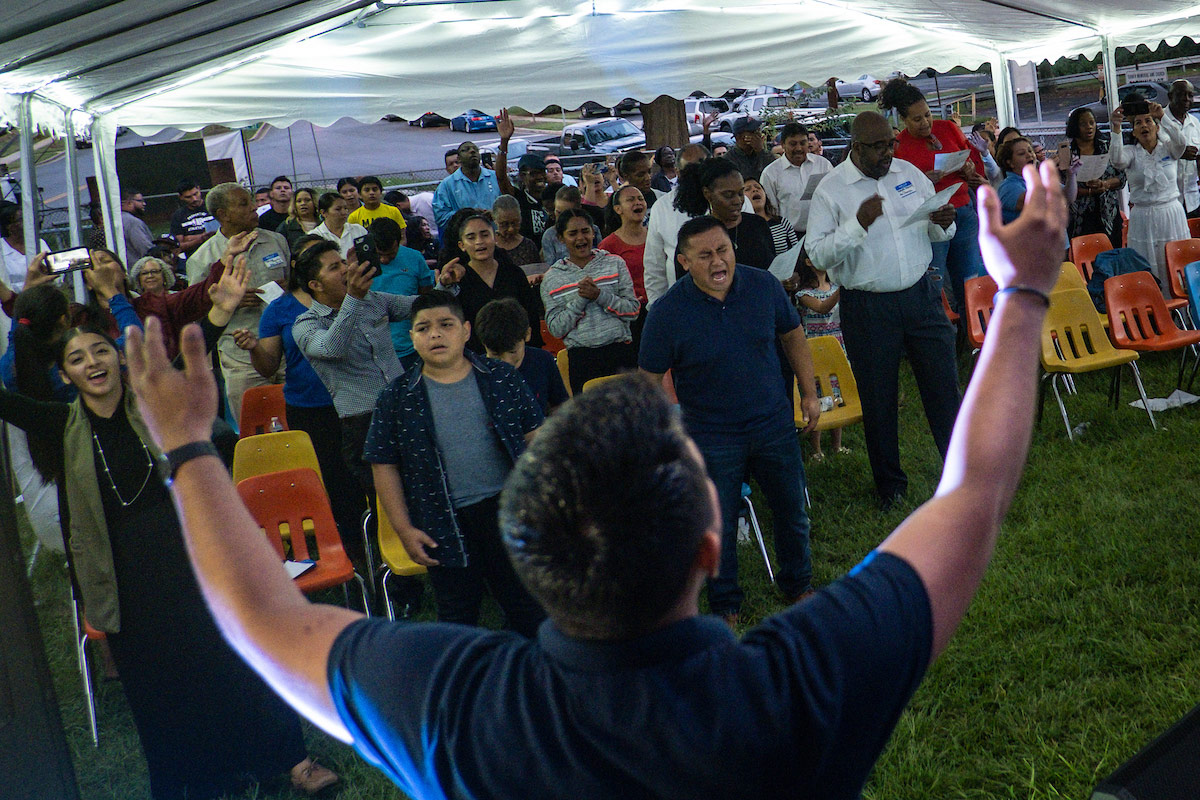
Grantees include colleges and universities, theological schools, denominational agencies, individual congregations and other faith-based organizations.
They represent and serve churches in a broad spectrum of Christian traditions, including Anabaptist, Baptist, Episcopal, evangelical, Lutheran, Methodist, Mennonite, Pentecostal, Presbyterian, Reformed, Restoration, Roman Catholic and Orthodox, as well as congregations that describe themselves as nondenominational. Several organizations serve congregations in Black, Hispanic and Asian-American traditions.
For more information about the grantees, please explore the interactive project directory.
About the Coordination Program
Leadership Education at Duke Divinity is supporting this initiative during a 5-year period through a coordination program. Funded by Lilly Endowment, the coordination program provides resources, research, technical support, and a learning community for the initiative’s grantees focused on innovation, collaboration, and adaptive learning.
The coordination program’s activities include hosting an annual gathering, online meetups and webinars; consulting with individual project directors; sharing resources; and communicating regularly.
This work is aligned with the work of Leadership Education, which was established by the Endowment in 2008 as an intermediary organization whose purpose is to strengthen Christian institutions that enable U.S. congregations and pastors to flourish. Leadership Education is also home to the Thriving in Ministry Coordination Program. The two initiatives are strategic companions and share a number of grantees.
Our collaborators
The Thriving Congregations Coordination Program is part of an ecology of Lilly Endowment-funded institutions that supports thriving congregations, thriving congregational leaders and thriving communities.
These partners conduct research, offer consultations, develop programming and share resources.
They include:
Alban at Duke Divinity School helps leaders connect and learn from one another by sharing practical wisdom, stories of thriving congregations and transformational models of ministry.
The Calvin Institute of Christian Worship promotes the scholarly study of the theology, history and practice of Christian worship and the renewal of worship in worshipping communities across North America and beyond.
The mission of the Center for Congregations is to strengthen Indiana congregations by helping them find and use the best resources to address their challenges and opportunities. Their Congregational Resource Guide is a free tool for congregational leaders, ordained and lay, to explore resources to address their unique questions and needs.
The Forum for Theological Exploration identifies, connects, inspires and supports young people across denominations and backgrounds as they explore or enter into vocations in ministry and teaching and lead their communities faithfully, innovatively and courageously to participate in God’s work in the world.
Lake Institute on Faith & Giving offers a public forum for exploring the connections between individual philanthropy and faith and fosters a greater understanding of the ways in which faith both inspires and informs giving.
Our staff

Alaina Kleinbeck
Associate Executive Director for Coordination Programs
akleinbeck@div.duke.edu
Alaina Kleinbeck is the Associate Executive Director for Coordination Programs at Leadership Education at Duke Divinity. She and her team support more than 300 grantees in the Thriving in Ministry and Thriving Congregations Coordination Programs.
She has served ministries and organizations in suburban St. Louis, urban Houston, Central America and Norway. She holds degrees from Concordia University Nebraska and Duke Divinity School. From 2013 to 2018, she was director of the Duke Youth Academy for Christian Formation. Before that, she was a director of Christian education working with middle school students. She is committed to developing faithful Christian practices within communities, eliminating barriers to resources for Christian communities and pastors at the margins, and including young people in all aspects of life in the church.

Angel Eaglin
Associate Director, Thriving Congregations Coordination Program
aeaglin@div.duke.edu
Angel Eaglin is a gifted educator with 20+ years of teaching and training experience in higher education, the public and private school systems and the nonprofit sector. Angel’s passion for reflecting God’s love across ministries has enabled her to develop leaders, build communities and create rich ecclesial experiences serving as a director of discipleship, worship arts director and worship leader in ministries in the Bay Area, Chicago and Raleigh. As a CQ® (Cultural Intelligence) Certified Facilitator, Angel combines her background in education design and instruction with practical training to help churches and faith-based organizations improve team effectiveness in multicultural interactions. Angel has been influential while serving in a myriad of roles including as a steering committee member for the Center for Public Christianity in North Carolina — a movement of churches seeking the cultural, social and spiritual renewal of the Triangle.
In addition, as an international recording worship artist, she cultivates a deep appreciation for the rich and diverse expressions of Christian traditions and practices across cultures, enabling her to create culturally immersive worship experiences.

Sarah E. Forsyth
Associate Director, Thriving Congregations Coordination Program
sforsyth@div.duke.edu
The Rev. Sarah E. Forsyth is the Associate Director of the Thriving Congregations Coordination Program at Leadership Education at Duke Divinity School. In addition, she regularly serves as an instructor at Duke Divinity School with classes on Formation and Discipleship, Homiletics and Bible. She holds degrees from Gordon College in Massachusetts and Duke Divinity School. Following the completion of her Masters of Divinity degree, Sarah served for several years as a pastor with a Christian Church (Disciples of Christ) congregation in Raleigh, North Carolina. Before that, Sarah worshipped and served in a wide variety of congregational contexts including United Methodist, Episcopal, Baptist, Church of the Brethren and Anglican. Her faith has been enriched by each of these communities. Sarah brings a spirit of wonder and a care for all parts of God’s creation to this work.

Averee Gentry
Program Coordinator, Thriving Coordination Programs
agentry@div.duke.edu
Averee Gentry joined Leadership Education at Duke Divinity as a program coordinator for Thriving Congregations and Thriving in Ministry in February 2024. She holds a bachelor’s degree in social entrepreneurship from Carson-Newman University and a master of divinity from McAfee School of Theology at Mercer University, where she did administrative work as a teacher’s assistant. She has previous experience coordinating events and doing customer service as a co-owner and store manager of her family’s donut shop in Knoxville, Tennessee.

Hannah Perez
Program Coordinator, Thriving Congregations Coordination Program
hperez@div.duke.edu
Hannah joined Leadership Education at Duke Divinity as a Staff Assistant in April 2020 and became a Program Coordinator in June 2022. Hannah provides operational support for all aspects of the coordination program as well as supporting other Leadership Education services. Prior to these roles, Hannah served as a development coordinator at the Institute for the Arts and Humanities at UNC-Chapel Hill and in administrative support roles at the Yale School of the Environment. Hannah graduated from Hope College and Johns Hopkins University.

Elise Erikson Barrett
Learning consultant, Thriving Congregations Coordination Program
elise.barrett@duke.edu
Elise serves as a learning consultant for the Thriving Congregations Coordination Program. A former ordained United Methodist pastor, she served churches in South Carolina as both a pastor and a pastor's spouse. Her current household includes persons worshiping with the Eastern Orthodox Church, the Roman Catholic Church, and the ELCA, and one of her favorite things about this work is experiencing the goodness of diverse parts of God's family working in community on these common challenges. Elise holds degrees from Hanover College (BA, Economics) and Duke Divinity School (MDiv), and she is pursuing a doctorate in American Studies at IUPUI.

David L. Odom
Executive director, Leadership Education at Duke Divinity
dodom@div.duke.edu
Dave is the executive director of Leadership Education at Duke Divinity. He joined Duke Divinity School in August 2007 to launch Leadership Education and now oversees all of its programs and publications, including Faith & Leadership. He regularly teaches and facilitates events and both writes and solicits content for Faith & Leadership. He is a graduate of Furman University, Southeastern Baptist Theological Seminary and Princeton Theological Seminary.

